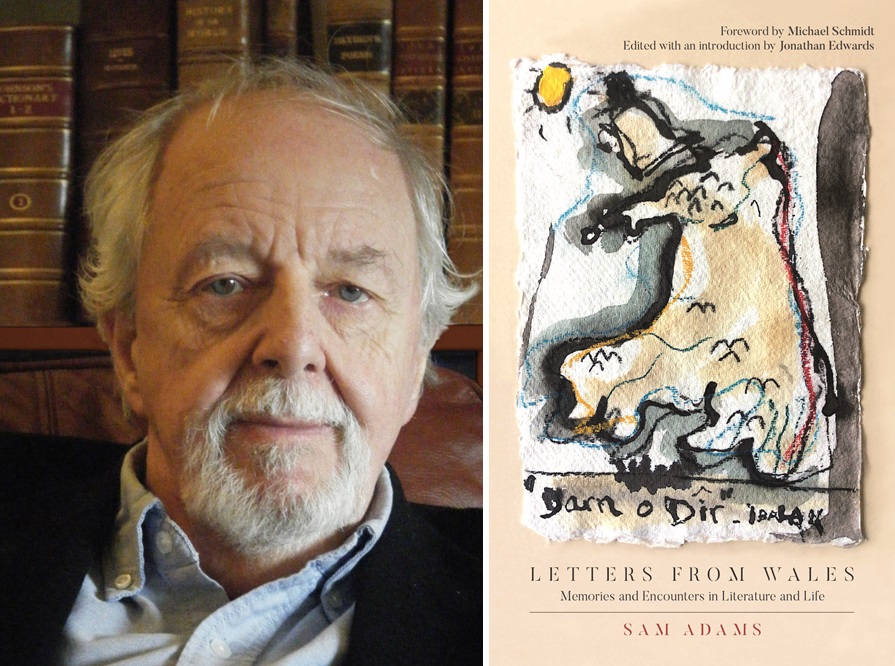Letter from Caerleon: On a 90th Birthday

Since 1996, Sam Adams’s ‘Letter from Wales’ column has been appearing in PN Review, one of the most highly regarded UK poetry magazines, offering insight and appreciation of Welsh writing, culture and history.
Now out in paperback, Letters from Wales: Memories and Encounters in Literature and Life collects a quarter century of work and offers one of the most unique, independent and passionate critical voices on the writing and cultural output of Wales during this period. Turning 90 last week, Adams offers his reflections on a life in letters…
Sam Adams
Back in 1973-74, Michael Schmidt, founder of Carcanet Press, wrote to Meic Stephens, then literature director of the Welsh Arts Council, to ask if he could suggest someone who would take on the job of editing a volume of Anglo-Welsh poetry for a series of anthologies the press planned to publish representing the various parts of the UK and Ireland.
At that time, writers, editors and publishers in Wales reached out to their counterparts in England, generally with little success, but here was an attempt to establish a link from the other side and Meic was glad to grasp the proffered hand.
I had worked with Meic, an old and much-missed friend, on Poetry Wales and went on to occupy the editorial chair of the magazine for a time when he left it for other things: he put forward my name. That introduction, leading to the publication of Ten Anglo-Welsh Poets in 1974, began an association with Michael Schmidt and, more particularly, PN Review, which he edits, that has lasted 50 years.
PNR is a literary magazine (now also available online) that attracts contributors from many countries, including for example Octavio Paz, Laura Riding, John Ashbery, Eavan Boland, Sinéad Morrisey and, among many others, Gillian Clarke and Jeremy Hooker from Wales.
Contributor
At first and for a long time I was an occasional contributor of poems and reviews to PNR, but in 1996, having retired from the day job and finding myself at last with time on my hands, I thought it might be worth trying something different, that is, brief essays about Welsh writers and aspects of literature and life here that had caught my attention and with which I could feel some sort of local connection.
Could they possibly interest a wider audience? Michael gave them the chance and supplied the title ‘Letter from Wales’ to the earliest of the pieces I sent. It has stuck. At first a ‘letter’ might appear in one or two of the six issues of the magazine annually, but for some time now I have been allowed to increase production.
There are no constraints on what I choose to write about. But then I have never strayed from my subject: Wales, its history and literature, and from time-to-time current concerns that affect how writers view the world.
New voices
Topics might range from an aspect of public life to the state of Welsh rugby, but, again, chiefly they are literary, about poets and writers, old friends and new voices among them.
To have the opportunity of writing about those I had long known and admired like Glyn Jones, Roland Mathias, Harri Webb, John Ormond, Leslie Norris, Raymond Garlick, that prickly troubadour John Tripp and, as they entered the scene, the wonderfully gifted somewhat younger talents of Robert Minhinnick and Gwyneth Lewis, has always seemed to me a great stroke of fortune, as is the pleasure of greeting newer voices like Jonathan Edwards.
Many changes have occurred in Wales since I began the series. Then there were still 30 or more working pits across the coalfield, though most of those were under sentence and the ones my father and grandfathers spent their working lives in long silent.
Gilfach Goch
Gilfach Goch is said to be the source and model of How Green Was My Valley. Today it is nothing like the valley I grew up in – the noise and smoke rising from three collieries, mountains of pit waste filling much of the valley floor, where the black waters of the Ogwr Fach wound at the foot of the tips. The valley and its people, friends, relatives, remain with me, of course, and from time-to-time insist I write something about the place and those times, besides having a subtle influence on all I write.
I passed my century of letters some time ago: this Parthian volume reprints over 130 and the score has mounted since it was first published. I have always considered myself lucky to have had the opportunity to a write about literature, the arts and aspects of life in Wales, and to write about them for the wide audience of PN Review has been a rare privilege.
My best hope is that this book stirs the thoughts and memories of older readers and perhaps stimulates the interest of the younger in where they live and the roots of heritage.
Support our Nation today
For the price of a cup of coffee a month you can help us create an independent, not-for-profit, national news service for the people of Wales, by the people of Wales.





